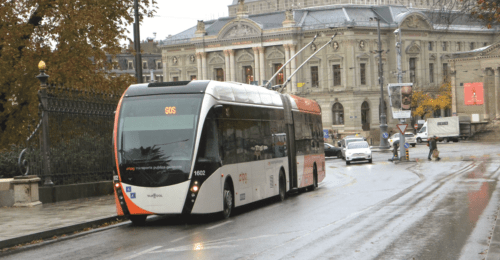
Van Hool has laid out its plans to firm up its business, shedding 1,100 staff and refocusing its production, though a number of investors are said to be waiting in the wings should it declare bankruptcy
On 11 March, Belgian coach, bus and industrial vehicle manufacturer Van Hool launched its business recovery plan, with which it envisions a sustainable future on its own merits. The company says that public transport will be approached more selectively as a market segment, and it plans to reduce its workforce by around 1,100 between 2024 and 2027.
The company presented its recovery plan to employee representatives at a special works council, and has expressed its intention to strategically refocus its activities towards market segments where customers consciously choose the high quality of Van Hool products.
In January, the company announced the appointment of Marc Zwaaneveld to the role of co-CEO at Van Hool, working with CEO Filip Van Hool, and with a particular focus on the process of accelerating and intensifying the firm’s post-pandemic recovery.
Van Hool said at the time that the pandemic had had a significant impact on the sectors and markets in which it is active, and in particular it had seen a sharp decline in demand for coaches, followed by disruptions to its supply chain along with high inflation as a result of macroeconomic and geopolitical uncertainties, both of which have had a major impact on the financial results of the group.
The company said that it had seen an initial recovery of volumes and orders, but warned that it was ‘essential to accelerate and intensify the process of recovery.’

Sustainable future
The company says the implementation its recovery plan is designed to refocus the business to enable a sustainable future under its own steam for the company, which ‘unfortunately also entails difficult interventions.’ The company said it deeply regrets that it will have to implement a necessary restructuring at its Koningshooikt site, which will see the departure of about 1,100 staff members.
Co-CEO Marc Zwaaneveld said: “We understand the impact this plan will have on employees and their families, and it is hard for us to take this step. However, given the highly pressing situation the company finds itself in, it is truly necessary to take these measures to secure a sustainable future for Van Hool. With this recovery plan, Van Hool remains a meaningful employer in Flanders.”
The company expects a reduction of around 830 jobs this year, which includes redundancies, retirement schemes and natural attrition. In 2025 and 2026, based on past experience, it expects over 50 more natural departures, followed in 2027 by around another 220 employees through redundancies and pension schemes. Once complete, the plan envisages direct employment of about 1,400 employees, along with supporting a further 1,600 jobs through indirect employment.
The company says the plan and the associated refocusing of operations are the answer to turn around the challenging financial conditions in which it finds itself, and that its management is determined to address those challenges and get the company back on track. The manufacturer says it will engage with customers from various markets, including public transport, to discuss the implications of this potential realignment, and will be more selective in accepting new orders from public transport operators.
Under the new plan, production of buses and coaches will mainly take place at company’s plant in Skopje, northern Macedonia. In Koningshooikt, its Industrial Vehicles division will focus on semi-trailers requiring a higher degree of expertise and offering higher added value for the customer as well as for Van Hool. The Bus & Coach division’s knowledge, research & development, prototype building and after-sales functions will remain in Koningshooikt.
The company was founded in 1947, and has recently suffered from the surprise loss of an expected large order for Belgian operator De Lijn contract to rival BYD.

Bankruptcy?
A number of Flemish and French language local media outlets have suggested that Guido Dumarey, who recently purchased Mellor parent WN VTech from administration, is among a number of interested parties waiting in the wings as a ‘white knight’ saviour for the Belgian company. Guido Dumarey has said that he would take over the ailing bus manufacturer, with promises to keep bus production and 1,800 jobs in Koningshooikt, but that the company would first have to be declared bankrupt, something he predicts could happen as soon as the end of this month unless additional finance to support its turn-around can be found.
“The companies I acquired all had problems. The experience I gained I would definitely be able to use if I were to take over Van Hool. The craftsmanship at Van Hool should not be lost and I see a future for it,” said Guido, who says he will keep 1,800 jobs in Belgium and that the main priority is to cut costs. “We need to standardise more. That way we can keep up with European competition. Inflation in recent years has had a big effect on manufacturing companies, as energy costs have also risen sharply,” he added.

